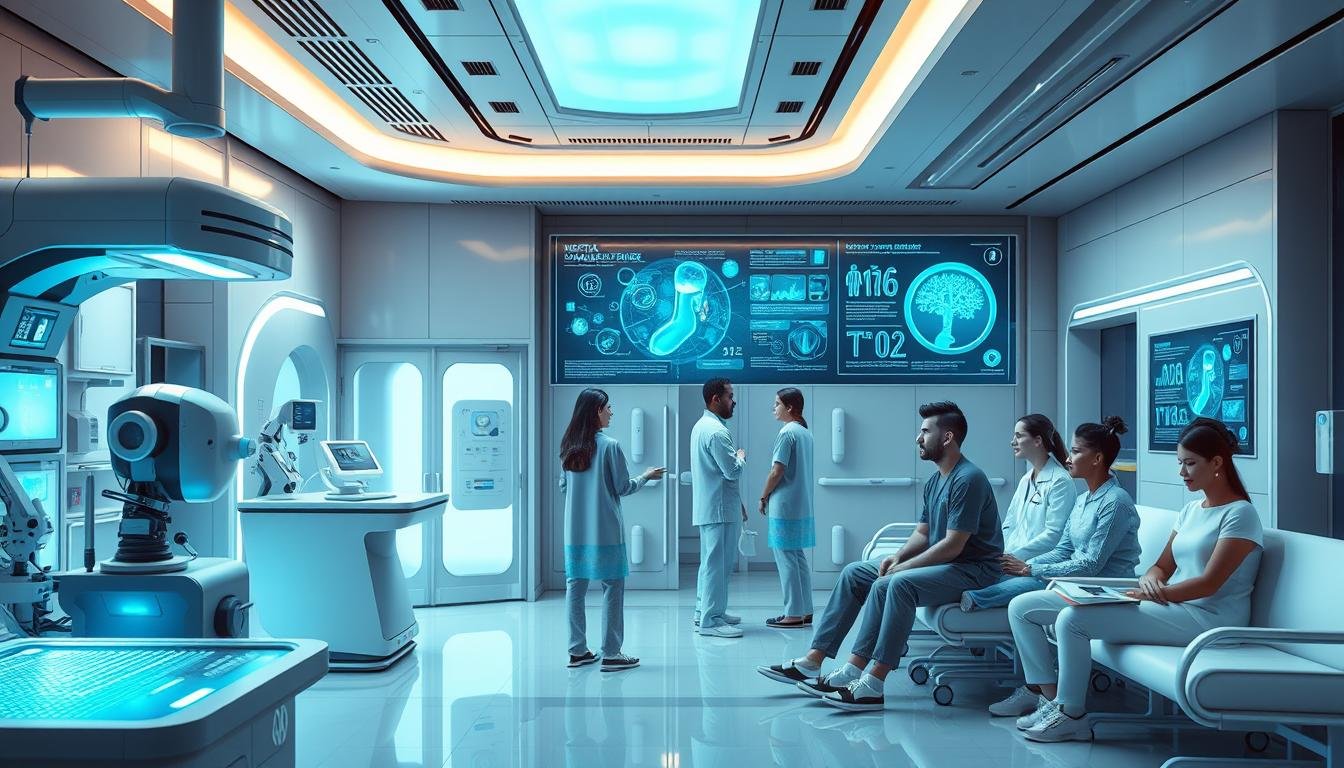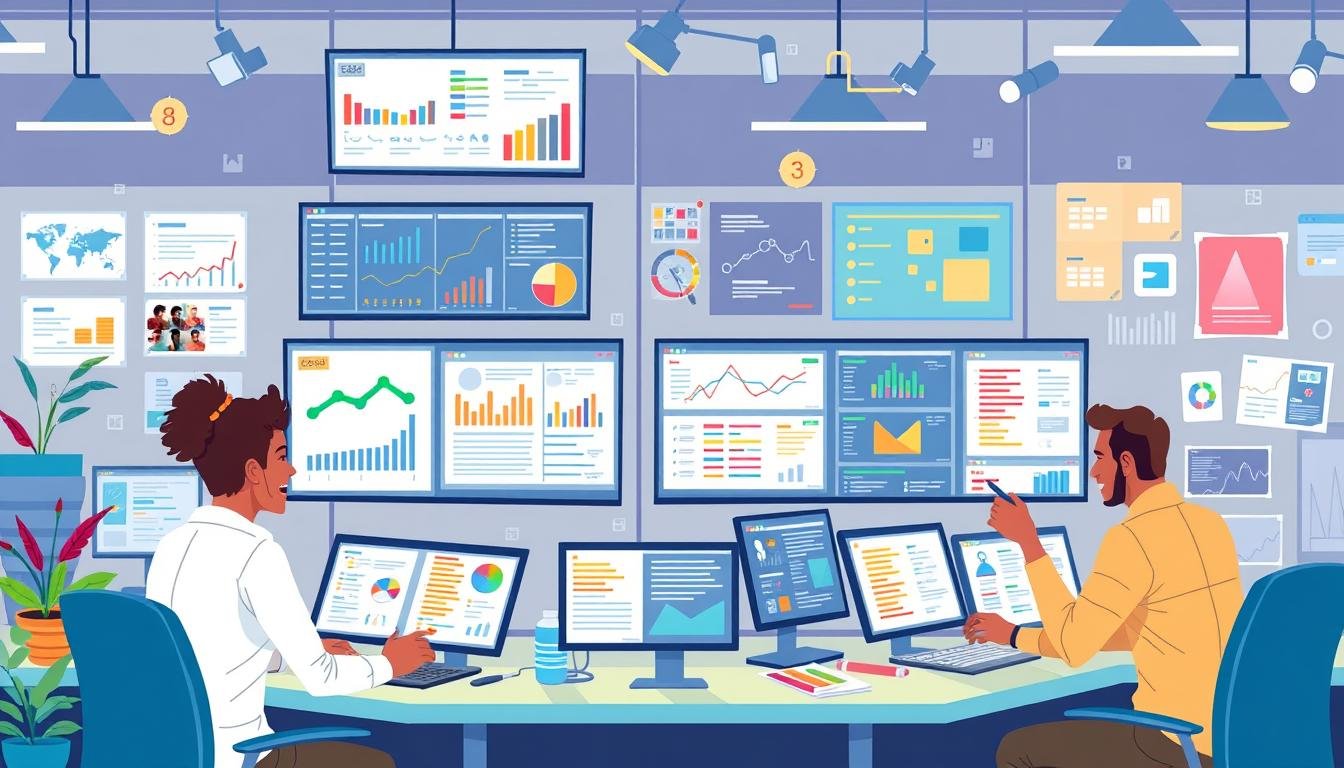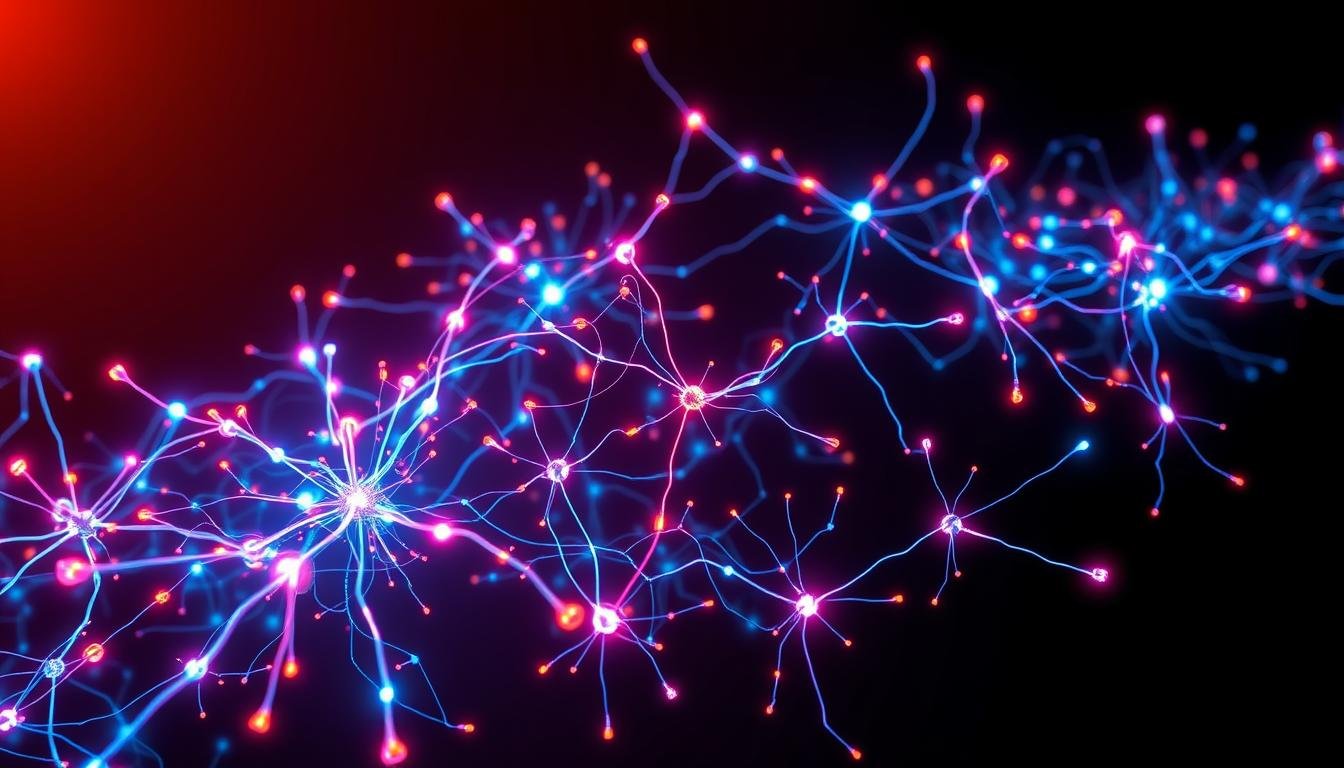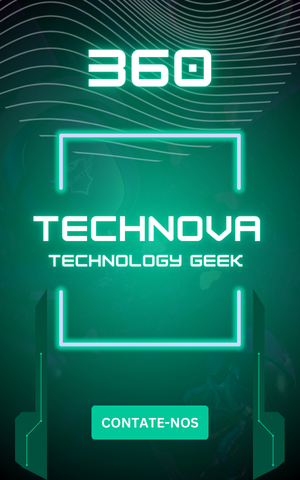Artificial Intelligence (AI) is a fast-growing field in computer science. It aims to make machines as smart as humans. AI uses machine learning, deep learning, and natural language processing to do this.
In healthcare, AI is changing the game. It helps with diagnosing diseases, choosing treatments, and making medicine more personal. Studies show AI can be more accurate and cost-effective than humans, saving time and reducing errors.
Key Takeaways
- AI is transforming healthcare by enhancing diagnostic tools, drug discovery, and personalized treatment plans.
- Machine learning and deep learning algorithms are driving improvements in areas like image and speech recognition in the medical field.
- AI-powered virtual health assistants and chatbots are improving patient engagement and automating routine tasks.
- Predictive analytics and risk assessment models enabled by AI are enabling early intervention and personalized care.
- AI is integrating into medical education to enhance learning experiences for students and instructors.
Introduction to AI in Healthcare
Artificial Intelligence (AI) has changed healthcare for decades. It started with simple systems in the 1980s and 1990s. Now, it uses advanced machine learning and deep learning.
This change has opened up new areas like medical diagnostics and drug discovery. AI is also making treatment plans more personal. Understanding AI’s history and its main parts is key to its future in healthcare.
Evolution of AI in Healthcare
In the early days, AI used rule-based systems. These systems, like MYCIN, helped diagnose and treat diseases in the 1970s and 1980s. Later, AI moved to machine learning and neural networks.
This allowed systems to learn from data and get better over time. A big moment came in 1997 when IBM’s Deep Blue beat chess champion Garry Kasparov. This showed AI’s power in making complex decisions.
After that, we saw the rise of virtual assistants like Siri and Alexa. They use natural language processing (NLP) to understand and answer human questions.
AI, Machine Learning, Deep Learning, and Natural Language Processing
Four key technologies drive AI’s impact on healthcare: machine learning, deep learning, and natural language processing. Machine learning lets AI systems learn from data and predict outcomes without being programmed.
Deep learning uses artificial neural networks to find patterns in big datasets. Natural language processing lets AI understand and create human language. This is used in tasks like coding, billing, and managing medical records.
These technologies are changing healthcare in many ways. They improve diagnosis, speed up drug discovery, and make patient care better through virtual assistants. As AI keeps evolving, it will have an even bigger impact on healthcare.
AI in Medical Diagnostics
Diagnosing diseases accurately is hard because of their complexity. But, AI is changing this by making diagnoses better. Machine Learning helps doctors make decisions faster and cheaper.
Improving Diagnostic Accuracy
AI uses deep learning to find patterns in big data. This helps it diagnose diseases like cancer and heart problems better than doctors. It’s shown to be very accurate in these areas.
AI-Assisted Disease Detection
AI is making healthcare better by helping diagnose and treat diseases. It uses big data to make decisions, saving time and money. For example, AI can spot breast cancer in mammograms more accurately than doctors.
In South Korea, AI was better at finding breast cancer than doctors. It also helped with skin cancer and other health issues. These examples show how AI is changing healthcare for the better.
“AI systems can detect breast cancer in mammograms more accurately than human radiologists.”
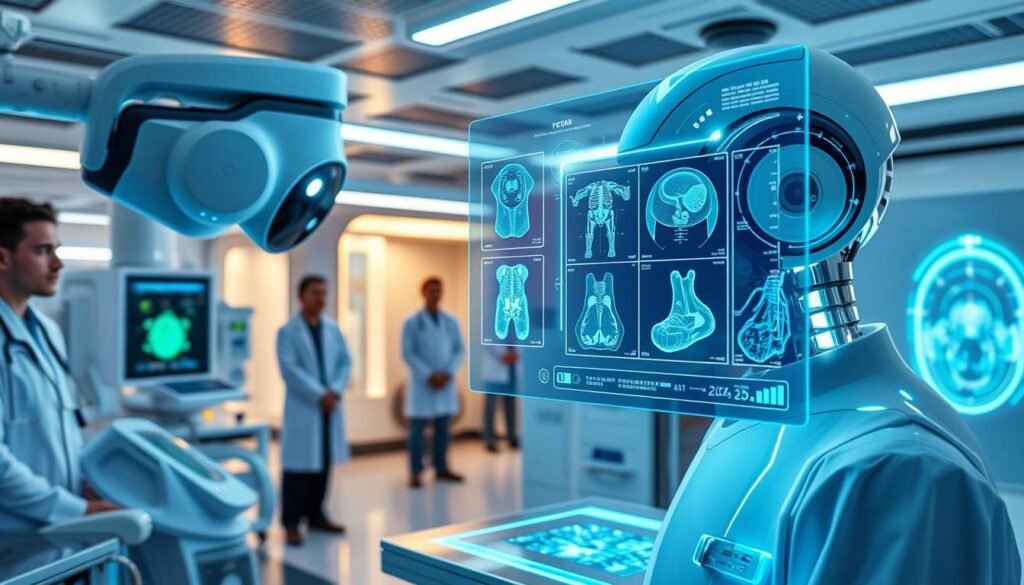
Drug Discovery and Development with AI
Creating a new drug is a long and expensive process. It can take over a decade and cost more than $1 billion. But, AI in drug discovery and development is changing this. With artificial intelligence (AI), machine learning (ML), and deep learning (DL), researchers can now accelerate drug discovery with AI and make the process smoother.
AI tools use big datasets to find patterns that humans might miss. They are more accurate and faster than humans in many healthcare areas. This means less mistakes and quicker discovery of new drugs. AI in pharmaceutical research also helps diagnose diseases, create personalized treatments, and aid doctors in making decisions. This improves care for patients everywhere.
AI is especially useful in predicting the 3D structures of proteins. Tools like AlphaFold2 are great at this. They help find molecules that can interact with proteins effectively. Graph machine learning also helps by modeling complex drug and disease relationships. This speeds up the drug discovery process.
| Metric | Value |
|---|---|
| Global healthcare spending | 6-7% of global GDP (8.5 to 9 trillion US$) |
| Cost to bring a new drug to market | Well over $1 billion |
| Time to bring a new drug to market | Up to 14 years |
| Success rate of cancer drugs in clinical trials | 3% |
| Potential drug target proteins in the human body | About 2700 |
| FDA-approved small molecule drugs | About 9600 |
AI is changing the drug discovery and development world. It promises faster, cheaper, and more tailored treatments. As AI gets better, we’ll see even more breakthroughs. This will transform pharmaceutical research and improve health worldwide.
Virtual Health Assistants and Chatbots
The healthcare world is changing fast. Virtual health assistants and chatbots are becoming key players. They help patients and make routine tasks easier. These AI tools are changing how we interact with healthcare.
Enhancing Patient Engagement
These tools give patients 24/7 access to health info. They help with symptoms, meds, and scheduling. They offer support and quick answers, making patients feel more in control of their health.
Chatbots are especially good for mental health. They offer a safe space to talk about feelings. They’re non-judgmental, helping people share things they might not with a doctor.
Automating Routine Tasks
Virtual assistants and chatbots can do many routine tasks. They handle scheduling, reminders, and even billing. This frees up doctors to focus on more important things.
| Feature | Benefit |
|---|---|
| 24/7 Access to Health Information | Improved patient engagement and support |
| Symptom Assessment and Medication Guidance | Reduced unnecessary doctor visits |
| Appointment Scheduling and Reminders | Streamlined healthcare workflows |
| Patient Record and Billing Management | Enhanced efficiency and cost savings |
Healthcare faces challenges like staff shortages and more demand for care. Virtual assistants and chatbots offer a solution. They help engage patients and make healthcare better. By using these tools, healthcare providers can give better care.
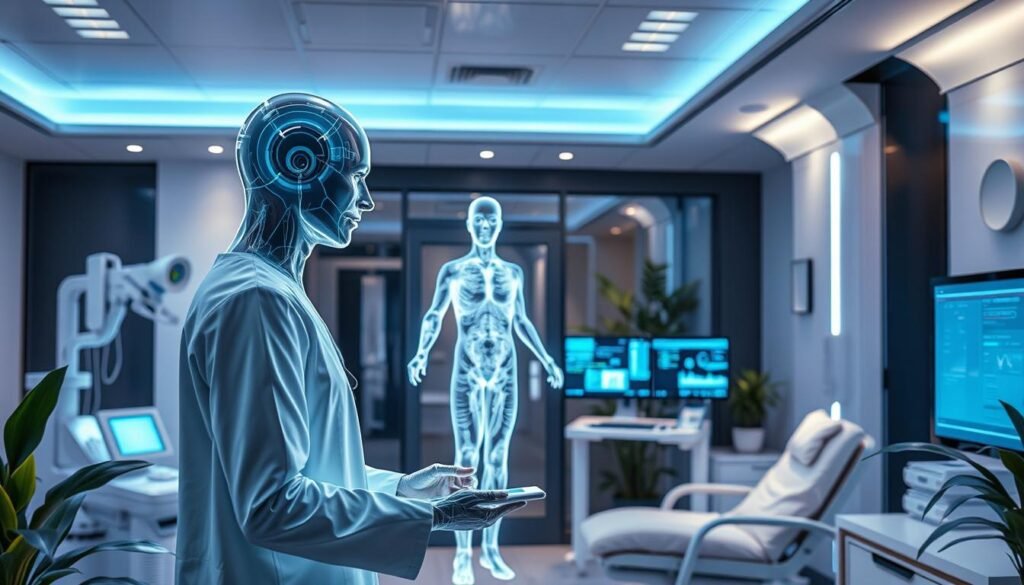
How AI is Enhancing Healthcare: From Diagnostic Tools to Personalized Medicine
Personalized Treatment Plans
Artificial intelligence (AI) is changing healthcare by creating personalized treatment plans. It looks at genetic, clinical, and lifestyle data to predict how patients will react to treatments. This leads to more effective and targeted care.
This approach is helping with early diagnosis and treatment for diseases like heart disease and cancer. It also helps with rare diseases such as cystic fibrosis.
Predictive Analytics in Healthcare
Predictive analytics, powered by AI, is also changing healthcare. It finds important insights in big datasets. This helps healthcare providers to better meet patient needs, leading to better outcomes and more efficient use of resources.
For example, an IBM AI model can spot severe sepsis in premature babies with 75% accuracy. This allows for quicker action and better care.
AI is making healthcare better by improving diagnosis, creating personalized plans, and using predictive analytics. It helps healthcare professionals give more personalized and effective care. This leads to better patient outcomes and drives innovation in the industry.
“Artificial intelligence has the potential to reduce costs across the healthcare industry by addressing medication errors, providing customized virtual health assistance, preventing fraud, and supporting more efficient administrative and clinical workflows.”
| AI Application | Impact |
|---|---|
| Predictive AI model for premature babies | 75% accurate in detecting severe sepsis |
| AI-powered decision support tools | Improved error detection and drug management |
| AI-assisted medical imaging analysis | Surpassing human radiologists in detecting conditions like breast cancer |
AI in Robotic-Assisted Surgery
The use of artificial intelligence (AI) in robotic-assisted surgery is changing the game. It makes surgeries more efficient and better for patients. AI helps surgeons make smarter choices before, during, and after surgery.
Enhancing Surgical Decision-Making
AI systems help surgeons by combining data from many sources. This includes surgical guidelines and research. AI tools can spot high-risk patients, find the best donors, and make better organ allocation decisions.
Benefits of Robotic-Assisted Surgery
- Improved precision: AI helps robots do surgeries more accurately. This means less invasive procedures, shorter stays, and less pain for patients.
- Enhanced visualization: AI clears the view during surgery by removing smoke and obstructions. This gives surgeons a clearer picture of what they’re doing.
- Automated tasks: AI handles routine tasks. This lets doctors focus on the complex parts of surgery.
The growth in AI-powered robotic surgery shows how much this tech can change healthcare. By improving AI for enhancing surgical decision-making, AI in robotic-assisted surgery is set to bring big benefits to both doctors and patients.
“AI is envisioned to augment surgeons’ decision-making and execution skills, rather than completely replacing human surgeons, emphasizing the role of AI as a supportive tool in the healthcare industry.”
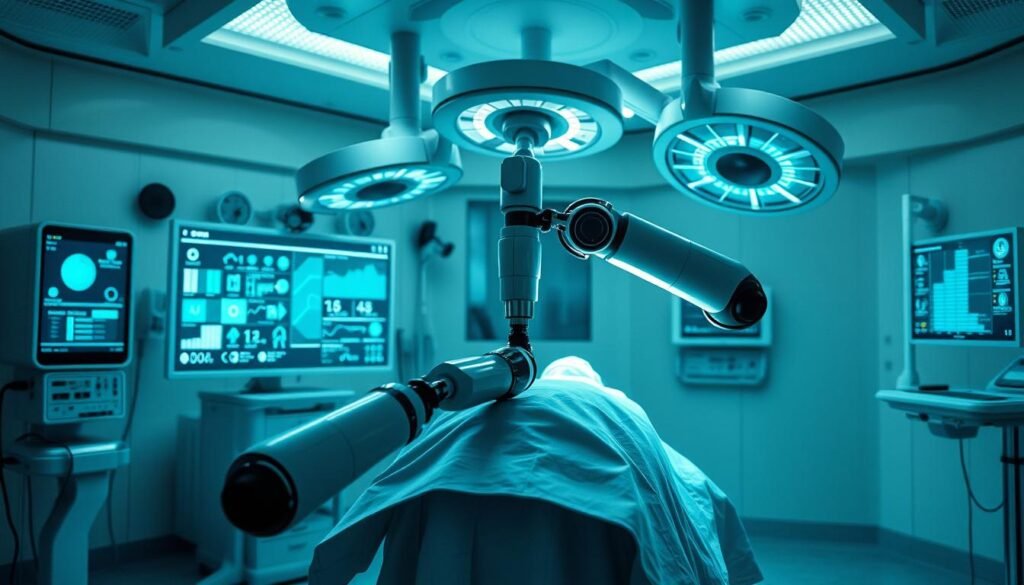
AI in Medical Education and Training
The healthcare world is changing fast, thanks to artificial intelligence (AI). AI is making a big impact in medical education and training. It’s changing how future doctors and nurses learn and get ready for their jobs.
Medical schools are quickly adopting AI in medical education. They use AI to make learning more dynamic and tailored to each student. AI simulations and virtual reality let students practice surgeries and diagnose illnesses safely. This way, they can improve their skills without risking patients’ health.
AI also helps tailor training to fit each student’s learning style. This makes learning more effective and prepares students to work with AI in patient care. It’s a big step forward in medical education.
Studies show AI use in medical education has grown a lot in the last 20 years. The American Medical Association (AMA) sees AI’s value in teaching. They’re working on how to include AI in medical school curricula.
| Key Benefits of AI in Medical Education | Potential Challenges |
|---|---|
|
|
As healthcare keeps evolving, AI in medical education and training is key. It helps prepare doctors and nurses for an AI-driven world. By using these new technologies, medical schools can offer better, more relevant education. This prepares students to give top-notch care with AI’s help.
Clinical Trial Optimization with AI
Clinical trials have always been complex and time-consuming. But, artificial intelligence (AI) is changing this. AI algorithms are now crucial in making these trials more efficient. They help in patient recruitment and in designing trials that adapt to new data.
Patient Recruitment and Eligibility
AI is making it easier to find the right patients for trials. It looks through lots of data, like medical records and genetic info. This way, it quickly finds people who fit the trial’s needs.
This makes finding patients faster and cheaper. It saves time and money for everyone involved.
Adaptive Trial Designs
AI is also changing how trials are set up and run. AI-powered adaptive trial designs let researchers adjust the trial as they go. They can change the plan based on new data.
This makes trials more likely to succeed. It helps make treatments safer and more effective. This is good for patients and the research team.
AI is a big step forward in clinical trials. It makes things run smoother, improves patient care, and speeds up finding new treatments. As healthcare keeps growing, AI and clinical trials will work together even more. This will lead to big changes in medical research.
“AI has the potential to transform the clinical trial process, making it more efficient, personalized, and data-driven. The future of healthcare depends on our ability to harness the power of AI to innovate and improve patient outcomes.”
Natural Language Processing in Healthcare
Natural language processing (NLP) has changed how we manage medical records. It helps us understand unstructured data like patient notes and clinical reports. This technology makes healthcare better by improving coding and patient care.
Streamlining Medical Records Management
NLP is great at sorting through lots of medical data. It turns text into data that computers can read. This makes it easier to find and use patient information, helping doctors make better decisions.
Automated Coding and Billing
NLP is also key in automating coding and billing. AI-powered automated coding and billing systems use NLP to assign the right codes. This cuts down on errors and lets doctors focus on patients, not paperwork.
The use of nlp in healthcare has made a big difference. It makes managing medical records and billing more efficient. With ai for medical records management, healthcare can improve patient care and use resources better.
“NLP has become a game-changer in healthcare, empowering providers to make more informed decisions and deliver better patient outcomes.” – Dr. Emily Wilson, Chief Medical Informatics Officer
Conclusion
Artificial intelligence (AI) is changing healthcare in big ways. It’s making patient care better, improving diagnosis, and speeding up drug discovery. AI also helps create treatment plans that fit each patient’s needs.
AI is used in many healthcare areas. It helps with medical tests, virtual health assistants, and managing medical records. It’s making healthcare more efficient and patient-focused.
As AI grows, it’s important to use it wisely. We need to make sure it helps both doctors and patients. This will lead to better care and more efficient healthcare in the future.
AI is bringing new tools to healthcare, like predictive analytics and machine learning algorithms. These tools can spot patients at risk and help prevent costly hospital stays. They also make finding and treating diseases faster and more accurate.
AI can also help with personalized medicine. It can look at lots of genetic and molecular data. This helps doctors create treatments that are just right for each patient.
But, there are challenges to using AI in healthcare. We need to make sure the data is good and private. We also have to follow rules and make sure AI works well with current systems. By solving these problems, we can make healthcare better for everyone.
